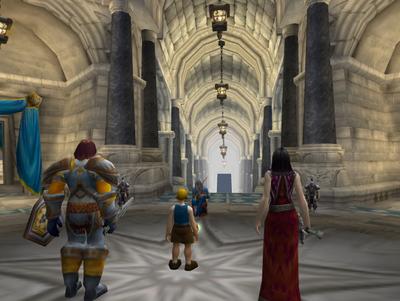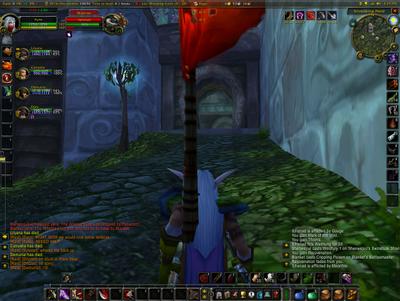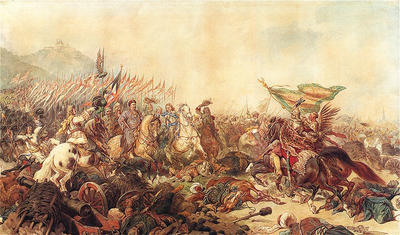Dr. Psychrates would like to query the audience again.
(can you tell that I'm a fan of the Socratic Method?)
Something about being in an MMORPG guild has always consistently irritated me. It's the intra-guild system (or lack thereof) of barter and exchange. Before I go down this road and ask the real question, we should briefly review some common social/economic structures.
The two that quickly pop into most heads are capitalism and socialism (sometimes bundled with communism). For our purposes, we're going to avoid the politics and history of these oft rivaled concepts, and focus more on the broader theory. Capitalism is, as Wikipedia defines it, "an economic system in which all or most of the means of production are privately owned and operated, and where investment and the production, distribution and prices of commodities (goods and services) are determined by the influence of market forces (in a "free market"), rather than by the state. Those in control of the means of production in capitalist societies have generally run them for monetary profit."
The virtual opposite concept, socialism, is a system of society or group living in which there is no private property; or a system or condition of society in which the means of production are owned and controlled by the state; or a stage of society in Marxist theory transitional between capitalism and communism and distinguished by unequal distribution of goods and pay according to work done. [Thanks to Merriam-Webster Online].
What we're concerned with here is distribution of wealth, and reward for work done. In a pure capitalist economy, people are rewarded with the profit made from their own work (merit). If you work less, you get less. If you work more, you get more. The drawback, as many note, is that if you cannot work, or cannot work more, due to something beyond your control, is it not the duty of those who have the ability to work to assist you? Too philosophical for us, so we'll skip it. In a pure socialist economy, everything is equally shared, regardless of how much work you put into something. Think of it as not ever seeing a paycheck from your job, but instead, the government sends you a stipend. Let's say you're a rocket scientist, and a genius, and have one of the most difficult and challenging jobs in the world. Your stipend would be the same amount as the stipend given to the person who took your order and cut your ham at the local deli. The drawback with this concept is that it supposedly does not promote exceptionalism or free thinking because there is no reward. (Imagine spending three hours doing your VC quest, and when you get back to turn in his head for your reward, the quest-giver thanks you for your assitance to the State, and your reward will be equally distributed to the entire populace, here's 3 silver, don't spend it all on Thunderbrew Lager. Kinda makes you never want to do anything outstanding any more at all if no matter what you do, you'll get the same pay for it. Think about this.)
So, what kind of economy is WoW, you ask? It's a modified capitalist/marketplace economy. But, as with most societies and economies, there are micro-economies within. Yes, I speak of guilds. If a guild sets up its own system of barter and exchange within itself, it can use whatever economy theory it wishes. If it works. So, let's examine some pros and cons of some potential guild economy builds, and perhaps come up with something workable.
The "Do it yourself" build: This is the most common. There's really no organization or formality involved, and it's just the guildies occasionally offering green items (maybe a blue here or there) to the guild in guild chat before the guildie goes and auctions it. It's not as if this system either "works" or "doesn't work," because it's not really even a system.
-Pros: don't have to worry about leeches, ninja guildies (those who join guilds just to get good stuff, and then leave quickly), or keeping track of anything at all (no need for a treasurer!)
-Cons: new guildies tend to feel left out if they don't get some free stuff early on (doesn't have to be "hey, n00b, here's your brand new full Blackened Defias set, minus the chest, a stack of 14-slot bags, and 20g to get you started on your first day!", but maybe, "hey, n00b, here's a gold to get you started... should be able to buy some decent starter stuff with that, and here's a complementary bag or three so you don't have to keep dropping stuff")
The "We do it all" build: This is the socialist, and least common build. This is a very formal, entirely opposite of the previously mentioned guild. It's so uncommon because when you're dealing with game players, it seldom works. Most players don't give a care about the economy, and if they come upon a purple item, to hell if they'll hand it over to the guildmaster just to maintain a weekly stipend of a few gold and some potions.
-Pros: everyone gets something, and the more the guildies work overall, the more overall everyone gets
-Cons: you are not guaranteed to receive the equivalent of what you put into the pot. (good for n00bs, bad for vets)
The "We do it some" build: This is an interesting build that I've actually seen, and seen work (for the most part). It's a mix between the first two. It works like this: You don't have to give everything you get to the pot, but you do have to supply an amount to the pot in proportion to your level, then the pot gets redistributed in reverse proportion to level. Get it? Hah. Example: You have three players in the guild. Bob (Level 10), Joe, (Level 20), Biajooka (Level 40). Bob must give to the guild 50 silver per week. Joe gives 1 gold. Biajooka gives 2 gold, 50 silver. That's a weekly pot of 4 gold. The guildmaster keeps a portion of the gold for the guild bank (in case of emergency, or a loan *more on this later*) and redistributes the pot, needy first: Bob gets 1 gold, 50silver, Joe gets 1 gold, Biajooka gets 50 silver. This method is good because you don't have to fork over actual items. Your items are YOURS, and you can use the AH to your heart's content, or be nice and offer them to guildies first. It's your choice. The other nice thing is that those ninja/leech guildies don't get a lot up front. You actually have to produce to receive. You miss a tithe, you lose your stipend (more money in the bank). You miss two tithes, you get warned. You miss three, you're out of the guild.
Other builds mix and match, like requiring you to relinquish all green items, but you can keep blue/purple, or any other combination. Most use the principles already discussed.
One of the major drawbacks of not having any system is the emergency/loan situation I referred to earlier. Let's say a long-time guildie sees a kick-arse blue Axe in the AH for an insanely low buyout (seller must be a moron, desperate, or apathetic), but the guildie is a few (or a dozen) gold short to get it. (this doesn't apply to 300-900 gold AH items, of course). It's nice if the guildie can ask for a guild loan to cover it. Thereafter, all that guildies subsequent stipends will go directly into paying off the loan, supplemented by whatever the guildie can afford to pay in time. Yes, it requires a level of trust and loyalty. Yes, it requires some accounting. However, it's a nice benefit, and if you think about it, the more you help individuals in the guild, the better the guild.
Anyway, stopping here for now. Anyone have ideas about what you think the best guild economic structure would be? Have you seen some others that work? That haven't worked? Why did they work or not? What could they have done to improve the system?
I'd love to hear what you all have to say.
Full Article


 [Ayae gets to meet the king. Or is that the king? The nasty lady in red says the king's on vacaction at his Redridge ranch house. So, who's that little brat? Hmmm.]
[Ayae gets to meet the king. Or is that the king? The nasty lady in red says the king's on vacaction at his Redridge ranch house. So, who's that little brat? Hmmm.]












